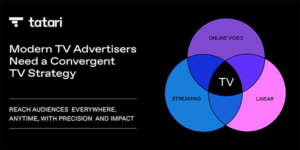Dowmecia Edgerton
OTT, or “Over The Top” programming is the latest wave in evolving consumer TV viewing habits, which presents dramatic new opportunities for DRTV advertisers.
First, some background. People of a certain age will remember sitting around THE TV in the house (only the wealthy had more than one) to watch whatever the family majority agreed on for the night. When the final episodes of shows like MASH and Cheers were broadcast, for example, everyone tuned in. It was an event.
The ubiquitous VHS player in the ’80s had a powerful impact on diffusing these events. People could now record shows and watch them later. Fast forward (pun intended!) to the birth of TiVo in 1999 (and the growth of DVRs since then), which made recording and watching shows even easier. These devices spurred a common cultural challenge to avoid spoilers before catching the latest, most talked-about programs. Content was still served in typical 30- and 60-minute blocks with ads interspersed at regular intervals.
Recently, the pace of change has been turbocharged with:
- the convenience of screens always at our disposal
- ample bandwidth for streaming, and
- stockpiles of content to binge-watch on a whim
This new way of consuming content on-demand has shaken things up for advertisers. That’s where OTT comes in.
What Is OTT — Over The Top — Programming?
Many consumers still subscribe to “cable” providers like Comcast, Time Warner Cable, Cox, or Altice. Many still watch scheduled programs at the particular time a program is offered, and on the particular channel, it’s presented on. But consumers have slowly been supplementing or replacing, these traditional “linear” TV viewing habits to stream some or all of their content over the Internet. Viewing in this manner is called Over The Top or OTT (perhaps because it is above and beyond the set-top cable box?).
Simply put, OTT is the ability to watch programs delivered through the Internet on platforms such as Hulu, Sling, or Netflix on your television, tablet, computer, or mobile device. Smart TVs have built-in Web connectivity and can stream through these apps at will. Non-smart TVs (without Internet capability) require a streaming device such as Roku, Amazon Fire TV, or Apple TV to connect to the Internet.
The Impact of Cord-Cutters, Cord-Shavers, and Cord-Nevers
The appeal of OTT is obvious: Content can be streamed wherever, whenever, however, and for as long as you want. It’s no surprise that viewing content this way is becoming more popular. Nielsen found that 29% of U.S. homes now have a smart TV and 23% own a digital streaming device (Roku and Apple TV have the highest penetration).
Some consumers have gone as far as replacing their old-school linear TV service entirely and now exclusively stream video content – “cord-cutters,” as they are called. By contrast, “cord-shavers” are not quite ready to cut the cord and have adopted both linear TV and video streaming.
The rise of OTT viewing presents opportunities for advertisers to reach dedicated viewers. This includes Millennials who may not have ever had traditional linear TV service (dubbed “cord-nevers”). From young viewers to seniors, OTT reaches all demographics (even those with traditional linear TV service). According to Scarborough USA+ (eMarketer), here’s a look at monthly OTT viewers by age:
- 18-24: 39.3 million (20.9%)
- 25-34: 52.5 million (27.9%)
- 35-54: 66.4 million (35.3%)
- 55+: 29.7 million (15.9%)
Viewing habits are changing across all demographics. In response to this shift, DRTV advertising tactics also need to evolve. OTT provides additional exposure and the ability to reach an audience that may not always be found watching traditional TV.
What This Means for Direct Response TV Advertisers
Television is still a critical platform for reaching consumers. Yet its very definition continues to evolve. Content is now available through numerous sources. In response to these changes, media agencies need to adjust their tactics on how to distribute video for clients. In this age of streaming content, it is critical to expand beyond linear television for your DRTV campaigns



